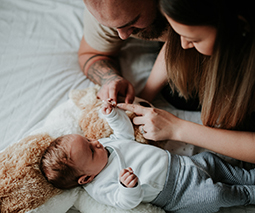How long does it really take to fall pregnant?

When you’re keen to start a family it’s natural to be curious or anxious about how long it’s going to take before you see that fine line show up on a stick. So, to give you an idea, here’s a rundown of the pregnancy process and all the factors that might affect your success.
From sex to expecting
Unfortunately, there isn’t a precise answer for how long it takes to fall pregnant, however, stats show that most healthy, fertile couples will conceive within three months of trying. Thirty percent of women will fall pregnant in the first cycle, 60 percent after three months, 80 percent within six months and 93-95 percent after four years.
Once a couple has successfully conceived though, it can take anywhere from 6 to 17 days for the fertilised egg to reach the woman’s uterus and start growing – this is the actual moment that confirms the pregnancy.

Trouble shooting
Falling pregnant may sound easy enough (particularly when we spend our younger years trying to prevent it occurring), but for some women it’s not that simple. There could be a number of different factors which might decrease your chances, some of which include:
- Being older – Unfortunately the more a woman ages, so do her eggs, which makes it harder for them to fertilise. In your 20s your chances of falling pregnant each month are 25-30 percent but after the age of 30 this drops (particularly after 35). Women who are 40 only have around a 5 percent chance each month, plus the quality of men’s sperm also starts declining after the age of 40.
- Anorexia and obesity – Disordered eating that can leave you severely underweight or obese can affect fertility, as both can cause an irregular menstrual cycle.
- Excessive alcohol, drugs and smoking – Even too much coffee has been proven to reduce a woman’s chance of conceiving.
- Medical conditions – Endometriosis, polycystic ovary syndrome, uterine fibroids, pelvic inflammatory disease, STIs, blocked fallopian tubes and chronic illnesses like cancer, diabetes and thyroid disease can all prevent you falling pregnant.
- Male issues – Your partner’s fertility may also hinder your chances of conception. Factors including cancer, testicular injury, undescended testicles, groin hernia, STIs, regular hot tub or sauna use, excessive alcohol or taking drugs, frequent long bike rides, exposure to toxins and chemicals, and even certain medications, can all have an effect on sperm production, motility and quality.

If you’re tired of waiting for a baby or your age is against you, there are a number of things you can try to help speed up the process. These include:
- Having sex at the right time – Women are at their most fertile around the time of ovulation so be sure to have regular sex at least a few days before you ovulate (as sperm can live for up to seven days inside), and also during ovulation (speak to your doctor or pharmacist about ways to help track ovulation).
- Having sex frequently – Practice makes perfect! Having sex as often as possible (at least two times a week or more during ovulation) is a good way to increase your chances of conceiving.
- Take pre-pregnancy vitamins – Folate and folic acid have been proven to boost women’s fertility and ensuring you have enough vitamin B and other vitamins is important too.
- Watch your health – Ensure you’re eating enough protein and other good nutrients, cut back on coffee and booze, exercise regularly and gets lots of sleep to make sure your body is at its baby-making best.
- Try natural therapies – Acupuncture and fertility massages have been known to help women conceive.
When to seek help
Around 10 percent of all couples are diagnosed with infertility at some point, but this doesn’t mean they can’t go on to have children with some assistance.
Most fertility specialists advise that you should try for at least one year before seeking help, however if you’re over 35 then you might want to speak to someone sooner than this. When you’re older, then it’s best to uncover and address any fertility issues early on to help increase your chances of falling pregnant, as you may need IVF or other forms of medical treatment.
If you are unable to have a baby the traditional way, don’t lose hope because there are other options such as using sperm or egg donors, surrogacy and adoption.
If you’re trying now, we wish you all the luck for your baby journey.









